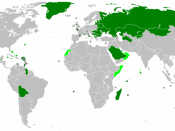Tax Systems
The most important source of a government's spending money is the taxes it collects from its people. There are a number of different systems a government can use to collect taxes. A few of the most common systems are national sales tax, flat tax and marginal tax. National sales tax is a system in which the tax is on goods people buy, and the revenue goes to the government. Flat tax is a proportionally equal income tax imposed on all citizens. A marginal tax system, which the United States uses, places taxpayers into brackets by income. The percentage of income taxed raises in each bracket.
The way a government taxes its people is often definitive of the way that government operates. Many people feel very strongly that one system or another is the ethical or fair way to collect taxes. Each system certainly presents fairness in at least some way.
At the same time, every tax system has its unfair qualities. However, fairness is not the only factor to consider about when comparing tax systems. Additional factors include complexity and efficiency, as well as the incentive or ability to cheat the system.
Efficiency is an important factor to the government collecting the taxes because an efficient tax system results in maximization of tax revenue. National sales tax is an efficient system. Efficiency is this system comes from the people's incentive to work harder. By making more money, they are not necessarily increasing the amount of tax dollars they have to pay, but they are subject to Adam Smith's "invisible hand" of economics and increase productivity in the economy. The people benefit because the only way a person pays more taxes is by spending more on goods or services. Flat taxing is efficient as well. Similar to national sales tax, a flat tax does not depend on the amount of income the taxpayer receives. All taxpayers pay the same flat rate. The workers have incentive to work more or harder and make more income because each additional dollar they make is being taxed the same as last one. Conversely, a marginal tax is not as efficient. Taxpayers' incomes are broken down into brackets and taxed progressively higher in each bracket. This does not create any incentive for the people to make more money, because the next additional dollar they make may be subject to a higher tax rate.
Fairness is definitely something to consider when comparing tax rates. It is also a widely debated issue to define precisely what is fair and unfair in taxation. To use a phrase from class, marginal tax systems are the most ethical from a "Robin Hood" point of view. That is, the rich pay more taxes than the lower-bracket income groups. The flat tax system can be seen as fair as well, since everyone is taxed the same flat rate. It is less fair, though, because the income still produces the tax. The national sales tax is least fair. It is more difficult for individuals who make less money to pay a heavy sales tax on goods and services at the poverty level. Again, fairness is extremely subjective and any approach arguably is fair from a different perspective.
When people fear doing their taxes more than death itself, it is a sign that the tax system is too complex. People are simple for the most part and need a simple and effective tax system. Marginal taxation is the most complex system by far. The many brackets, exemptions, and credits are enough to make a good number of people pay to have their taxes calculated for them. The flat tax system is very simple. The government taxes the same percentage of every worker's income. Virtually any receiver of income can figure this system out. National sales tax is simple as well. The people do not even have to think about their taxes, because the tax takes place when they make a purchase.
The average person is always going to try to maximize the amount of money they have. Sometimes this means cheating on their taxes if the opportunity presents itself. The flat tax system presents virtually zero chance to cheat, because everyone is taxed the same percentage. Conversely, national sales tax and marginal tax have their loopholes. For example, in marginal tax systems, people will lie on their tax statements about their income, dependants, or other things to put them in lower tax brackets. Additionally, the national sales tax system has a flaw in black markets. Using black markets, customers pay no sales tax and therefore evade taxation of any kind.
The tax system in the United States is fair. However, it is inefficient and it is very complex. It has a flaw because billions of dollars are lost each year to people who cheat on their taxes. It costs billions of dollars to run the IRS and compute taxes. People pull their hair out trying to do their taxes correctly without paying too little or too much. It is an invasive system with no regard for privacy. Should we change it? We definitely should not change it. A change that drastic in economic policy could potentially lower national and international confidence in the United States government and its dollar. People demand consistency and dependency. A country that has abided by essentially the same system since the ratification of the 16th amendment (1916) (www.fairtax.org) can not sporadically decide to imply a different system. National sales tax is far too unfair to families in poverty trying to get by on Ramen Noodles and canned food while being taxed for it more than they can pay. A flat tax sounds nice, but Americans are not going to want to give up their mortgage deductions and other exemptions. That policy could also end up being unfair to low income Americans. Our system may have its flaws, but it is nothing that is irreparable. It needs to be modified, simplified, and secured, but not trashed. Besides, it is the American way. It may be expensive, but we're America, the best damn country in the world, and we can afford it. After all, a country gets what it pays for and no good tax system is going to be cheap.


